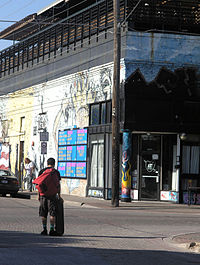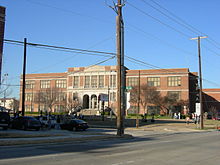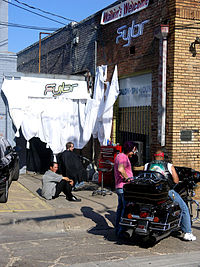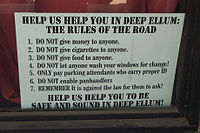- Deep Ellum, Dallas, Texas
-
 A skater along Main Street in Deep Ellum
A skater along Main Street in Deep Ellum
Deep Ellum (a corruption of "deep Elm Street") is an arts and entertainment district near downtown in east Dallas, Texas (USA). It lies directly east of the elevated I-45/US 75 (unsigned I-345) freeway and extends to Exposition Avenue, connected to downtown by, from north to south, Pacific, Elm, Main, Commerce, and Canton streets. The neighborhood is north of Exposition Park and south of Bryan Place.
Contents
History
Industrial beginnings
The area got its start in 1884 when Robert S. Munger built his first factory, for the Munger Improved Cotton Machine Company, in what is now Deep Ellum. In 1913, Henry Ford opened an assembly plant here to supplement the manufacture of the Ford Model T at the Detroit plant. In 1916, the first building built for and by blacks in Dallas—The Grand Temple of the Black Knights of Pythias—was built in Deep Ellum at Good-Latimer and Elm Street, later turned in to the Union Bankers Building .[1]
Jazz and blues
Deep Ellum became distinguished as a prime jazz and blues hotspot in the South. Artists such as Blind Lemon Jefferson, Robert Johnson, Huddie "Leadbelly" Ledbetter, and Bessie Smith played in Deep Ellum clubs like The Harlem and The Palace.
In 1937, a columnist described Deep Ellum as:
...[the] one spot in the city that needs no daylight saving time because there is no bedtime...[It is] the only place recorded on earth where business, religion, hoodooism, gambling and stealing goes on at the same time without friction...Last Saturday a prophet held the best audience in this 'Madison Square Garden' in announcing that Jesus Christ would come to Dallas in person in 1939. At the same time a pickpocket was lifting a week's wages from another guy's pocket, who stood with open mouth to hear the prophecy.[2]At the time, you could find gun and locksmith shops, clothing stores, the Cotton Club, tattoo studios, barber-shops, pawn shops, drugstores, tea rooms, loan offices, domino halls, pool halls, and walk-up hotels. On its sidewalks you could find pigeon droppers, reefer men, craps shooters, card sharps, and sellers of cocaine and marijuana.[2] Sometime around World War I, Leadbelly and Blind Lemon Jefferson got together and began composing folk tunes, with Dallas often in the lyrics. In a song called "Take A Whiff On Me":
Walked up Ellum an' I come down Main,
Tryin' to bum a nickel jes' to buy cocaine.
Ho, Ho, baby, take a whiff on me.[2]Another song about Deep Ellum, "Deep Ellum Blues", included:
When you go down on Deep Ellum,
Put your money in your socks
'Cause them Women on Deep Ellum
Sho' will throw you on the rocks. (chorus)
Oh, sweet mama, your daddy's got them Deep Ellum Blues.
Oh, sweet mama, your daddy's got them Deep Ellum Blues.[2]Expanded scene
During the 1960s and 1970s, Deep Ellum was largely a warehouse and industrial district which started to attract artists to the cheap loft space that was available. One of the first was a 1982 "nightclub" called Studio D on Main Street featuring local punk bands like Stick Men With Ray Guns and The Hugh Beaumont Experience. In fact, the "club" was nothing more than an empty warehouse equipped with a drum riser, and a card table by the door to collect the $2 cover charge and home to empresario Frank Campagna. "After we built that riser on a hot Texas evening in preparation for a Dead Kennedys show the next evening, we visited a local bar for a beer," recalls Marc Salomon, "and the exposed white skin in the African American bar was a hint as to what would become one of many waves of displacement where white hipsters shoved out people of color for a cheap place to party." However, such an unassuming environment was the perfect place for the early punk bands, and many national acts played here, including The Dead Kennedys, Black Flag, and The Meat Puppets.
While Studio D certainly represented the punk rock audience, the first live music venue to feature a broad cross section of musicians, visual artists, performance artists and theatre performers was the Theatre Gallery. This venue hosted live shows by local bands The Butthole Surfers, Old 97's, Toadies, and Tripping Daisy, and other bands like Bad Brains, Hüsker Dü, The Replacements, Red Hot Chili Peppers, 10,000 Maniacs, New Bohemians, Decadent Dub Team, Flaming Lips, End Over End (who was the first local band to perform at TG as "The End"), Three On a Hill, and Shallow Reign. The house sound crew included Jim Heath, later known as The Reverend Horton Heat. TG also featured art openings by painters / visual artists Ron English, Jeff Robinson, Bill Haveron, Matt Miller, Greg Contestible, Richard Hoefle, and Chris Cole.
Later, the club's owner Russell Hobbs converted to Christianity, and opened a venue called The Door which had eventually moved into the old Gypsy Tea Room space after the old Door location was torn down. TG booking agent Jeff Liles went on release a number of spoken-word records under the name Cottonmouth, Texas. Liles still writes a weekly blog column about the history of Dallas music called "Echoes and Reverberations". His first group, Decadent Dub Team, contributed the song "Six Gun" to the soundtrack to the film "Colors", remixed for the film by Dr. Dre.
Another early milestone occurred with regular parties with DJs at the old Clearview Louver Window building. The multi-room environment with different DJs and bands was very successful, but, following an exposé in Spin, the club was evicted from the building. Clearview moved to another location, taking the old building's signature "Clearview" neon sign, and the multi-room format, along with it. It was among the longest-running clubs in Deep Ellum, finally closing December 31, 2006. Other early- to mid-1980s nightspots were Prophet Bar, the Twilight Room (later named Circle A Ranch), the 500 Café, The Main Bar, Empire, Video Bar, and Club Dada, the Gypsy Tea Room, and Trees.
At this point, with the closure of Dallas' other two punk-rock clubs (DJ's and the Hot Klub), Deep Ellum became the de-facto home of the area's bourgeoning punk scene. Not yet promoted by associations or the city, the area had still acquired considerable "buzz" on the streets, and had become another primary live-music destination, in addition to the traditional Lower Greenville area.
In the late 1980s, due to increasing problems, and pressure from newly-formed local business groups like the Deep Ellum Association, the city of Dallas began upgrading roads, lighting, and parking along Main, Elm, and Commerce streets. Up until this time, the streets had been rather neglected, and there was little lighting, leaving the whole neighborhood dark, and dangerous-seeming. Also, the area had already become associated with the burgeoning punk-rock scene, still viewed with great suspicion by the local authorities. And not entirely without reason: local skinheads and fans of the then-new hardcore punk scene in particular were often seen agitating the dark streets and alleys. Although purists decried the loss of their original atmosphere, the newly-lit streets did lead to lower crime, and it was at this point that the area really began to take off commercially.
Entertainment district
The 1990s were a high point for Deep Ellum as Dallas' liveliest entertainment district. By 1991, Deep Ellum had 57 bars and nightclubs. There were restaurants, tattoo parlors, other diverse retail shops, and an increasing amount of high-rent residential loft space. Notable businesses of the 1990s included Deep Ellum Live (closed in 2004), Trees (closed late 2005, reopened August 2009), 2826, Club Dada (closed & reopened 2006), The Angry Dog (a restaurant, still in business), Monica's Aca y Alla (a restaurant, still in business), Looker Hair Group (a salon), Galaxy Club (closed early 2007), the Green Room and Tarantino's (both restaurants closed September 2006), and The Red Blood Club (closed & reopened 2007,and then closed again in 2008).
One notable event involves Russell Hobbs, the former owner of Theatre Gallery and the Prophet Bar, who, in early 1988, converted to Christianity, closed his two still-popular clubs, and opened The Door, a Christian oriented venue. An interesting success story involves the restaurant Monica's Aca y Alla. Eduardo Greene. owner of Eduardo's Aca y Alla, divorced his wife, had a highly publicized sex-change and reopened under her new name. Monica's Aca y Alla remains a trendy hotspot today.
Life in Deep Ellum opened in January 2007. The 23,000-square-foot (2,100 m2) venue features Mokah Coffee Bar, the Live@Mokah concert venue (www.liveatmokah.com) and Mokah Art, a large gallery space.
Crime recession
At one point, Deep Ellum had become such a popular attraction that the streets often were blocked off to traffic, especially on weekends. It also spawned several events like the Deep Ellum Film Festival and Deep Ellum Arts Festival. However, week-end nights now find the streets much emptier than did the 1990s. New events such as the CODE (Culture Of Deep Ellum) events, and Dallas Rock Meetup Group monthly festival, involve multi-venue, multi-band performances that hope to maintain Deep Ellum's viability as a live music hotspot.
Today, Deep Ellum struggles with a perception of a high crime rate that has made people reluctant to visit the area. In mid-2006, local papers had begun to report the near-demise of the neighborhood, as a large percentage of the long-time live music venues had closed that year, leaving mostly clubs oriented more towards 'hip hop' music, dancing and drinking, and radically altering the "feel" of the area. In 2007, several additional small and medium clubs had closed, although new live-music venues spring up without warning. Things have turned around somewhat in 2009 and 2010, as evidenced by a slew of new bar, live music venue and restaurant openings. Some of the recent and planned openings include the re-launch of the near-legendary venue Trees, old favorites such as Club Dada and The Green Room, Tucker's Blues, The Boiler Room, Anvil Bar and La Grange.
It is a time of transition. In 2007, the City Of Dallas encouraged large scale residential, multi-family dwelling construction in Deep Ellum, in hopes of making it more financially successful. However, no new area or neighborhood besides Deep Ellum has arisen for Dallas' indie and blues musicians with the access to venues and grass-roots spirit once associated with Deep Ellum.
The Scene
- [1]- Online Social Network For Deep Ellum
Shopping
- Main Street Mercantile- 2707 Main Street (American Antiques)
- Office Equipment Company- 3500 Commerce Street (New and Used Office Furniture)
Live music venues
Deep Ellum has several live music venues:
- Adair's Saloon - 2624 Commerce Street
- AllGood Cafe - 2394 Main Street
- The Bone - 2724 Elm Street
- Curtain Club - 2800 Main Street
- Club Dada - 2720 Elm Street
- The Door - 3202 Elm Street (Moved to Gypsy Tea room's building)
- Double Wide - 3510 Commerce Street
- Live@Mokah(Life in Deep Ellum) — 2803 Taylor Street
- The Liquid Lounge - 2800 Main Street
- Sons of Hermann Hall - 3414 Elm Street
- Renos Chop Shop - 210 N. Crowdus Street
- Lizard Lounge/The Church - 2424 Swiss Ave.
- Trees - 2709 Elm Street
- The Prophet Bar - 2458 Elm Street
- 2826 Arnetic - 2826 Elm Street.
Resources
- Deep Ellum Social- Online Social Network For Deep Ellum
Event Centers
2616 Commerce Place - www.2616commerce.com
Performing Arts
- Ad-Libs - 2626 Main Street
- The Hub Theater - 2809 Canton Street
- Undermain Theater - 3200 Main Street
- DALLAS COMEDY HOUSE - 2645 Commerce Street
Art Galleries
- 500X Gallery - 500 Exposition Avenue
- AND/OR Gallery - 4221 Bryan Street
- The Public Trust - 2919-C Commerce Street
- Barry Whistler Gallery - 2909-B Canton Street
- Blue Square Art Gallery - 3023 Commerce Street
- Dahlia Woods Gallery - 600 Cantegral Street
- Gallery 2910- 2910 Commerce Street
- Hal Samples
- Kettle Art Gallery - 2714 Elm Street
- Mokah Art—2803 Taylor Street
- Mutt Gallery - 3405 Main Street
- Nine Eyes Studio - 130 N. Peak Street
- Pawn Gallery - 2540 Elm Street (closed Fall 2008)
- Pidgeon Stone Project Gallery - 3311 Commerce Street
- Revolution Gallery - 3309 Elm Street
- Road Agent Gallery - 2909-A Canton Street
- Steve Paul Productions - 2814 Main Street
- Studio Fling - Main Street
- 2826 Arnetic - 2826 Elm Street.
Restaurants
- Baker's Ribs - 2724 Commerce Street
- Cafe Brazil - 2815 Elm Street
- Cowboy Chow - 2801 Commerce Street
- Deep Sushi - 2624 Elm Street
- Mokah Coffee Bar - 2803 Taylor Street
- Monica's Aca & Alla - 2914 Main Street
- Omega's Mexican Restaurant - 212 N. Crowdus Street
- Pepe & Mito's - 2911 Elm Street
- Twisted Root Burger Co.- 2615 Commerce Street
- St. Pete's Dancing Marlin - 2730 Commerce Street
- Istanbull Grill, Gyros, and Kebabs - 2704 Elm Street
- All Good Cafe - 2934 Main Street
- Angry Dog - 2726 Commerce Street
- Rudolph's Market & Sausage Factory - 2924 Elm Street
- Sol's Taco Lounge - 2626 Commerce Street
- Daddy Jack's Wood Grill - 2723 Elm Street
- Zini's Pizzeria - 2639 Elm Street
- Serious Pizza - 2807 Elm Street
Bars
- Elm Street Bar - 2812 Elm Street
- Reno's Chop Shop - 210 Crowdus
- July Alley - 2809 Elm Street
- Lizard Lounge/The Church - 2424 Swiss Ave.
- The Lounge - 2810 Elm Street
Graffiti
In addition to live music, Deep Ellum is a hot-bed for graffiti. Many of the music venues use graffiti artists to advertise music shows. In the late 1980s, the city allowed a number of local artists to paint walls of the Good Latimer Expressway tunnel (a major entry to the neighborhood). The wide variety of images, largely in a 'graffiti' style, has long been a popular display, leading many to conclude (incorrectly) that the city allows graffiti in parts of Deep Ellum. The tunnel was demolished in spring 2007 to make way for the DART Green Line train.
Transportation
Highways
Trains
- DART Green Line
- Deep Ellum Station
- Baylor University Medical Center Station
Education
 North Dallas High School serves residents north of Commerce Street
North Dallas High School serves residents north of Commerce Street
Deep Ellum is served by the Dallas Independent School District.
Residents of Deep Ellum north of Commerce Street are zoned to Ignacio Zaragoza Elementary School, Alex W. Spence Middle School and North Dallas High School.[3] Residents south of Commerce Street are zoned to City Park Elementary School, Billy Earl Dade Middle School, and James Madison High School.[4]
References
- ^ The Deep Ellum Association - Time Line. Retrieved 4 October 2006.
- ^ a b c d Payne, Darwin (1982). "Chapter VI: The Spirit of Enterprise". Dallas, an illustrated history. Woodland Hills, California: Windsor Publications. pp. 157–185. ISBN 0-89781-034-1.
- ^ Dallas ISD - 2006 School Feeder Patterns - North Dallas High School. (Maps: ES: Zaragoza; MS: Spence; HS: North Dallas.) Retrieved 1 January 2007.
- ^ Dallas ISD - 2006 School Feeder Patterns - James Madison High School. (Maps: ES: City Park; MS: Dade; HS: Madison.) Retrieved 1 January 2007.
External links
- Pask, Kevin. "Deep Ellum Blues" Southern Spaces, 30 October 2007.
- DEEP (Deep Ellum Enrichment Project)
- The Deep Ellum Association
- Deep Ellum Residents Council
- Complete Deep Ellum Business Listing
- Deep Ellum Film Festival
- Deep Ellum Arts Festival
- History of Deep Ellum compiled by the Dallas Observer
- Deep Ellum Residents Council on Myspace
- Extensive gallery of Good-Latimer Tunnel murals
- Deep Addison
- Empyrean Events- Deep Ellum based event promoters
- Headlines about Downtown Dallas and Deep Ellum from The Dallas Morning News
- The Door moves into Gypsy Tea Room
Neighborhoods in Dallas Downtown East Dallas Belmont | Bryan Place | Casa Linda Estates | Casa View | Deep Ellum | Eastwood | Forest Hills | Greenland Hills (M Streets) | Hollywood Heights | Lake Park Estates | Lakewood | Lakewood Heights | Little Forest Hills | Lower Greenville | Lochwood | Old Lake Highlands | Parkdale Heights | Ridgewood Park | Santa Monica | Wilshire Heights
Old East Dallas: Junius Heights | Munger Place Historic District | Peak's Suburban Addition | Swiss AvenueLake Highlands Abrams Place | Alexander's Village | Boundbrook Oaks Estates | Chimney Hill | Copperfield Community | Country Forest | Forest Highlands | Forest Meadow | Glen Oaks | Hamilton Park | Highlands West | Highland Meadows | High Oaks Addition | Jackson Meadow | L Streets | Lake Highlands Estates | Lake Highlands North | Lake Highlands Square | Lake Ridge Estates | Merriman Park/University Manor | Merriman Park North | Moss Farm | Moss Meadows | Northwood Heights | Oak Highlands | Oak Tree Village | Pebble Creek | Richland Park Estates | Rolling Trails | Royal Highlands | Royal Highlands Village | Stultz Road | Town Creek | Royal Lane Village | Walnut Creek Estates | Whispering Hills | White Rock Valley | Woodbridge | Woodlands on the Creek | University Terrace | Urban ReserveNorth Dallas Bluff View | Devonshire | Greenway Parks | Melshire Estates | Northwood Hills | Platinum Corridor | Preston Center | Preston Hollow | Telecom Corridor (Richardson) | Vickery Meadow | Vickery Place
Far North Dallas: Bent Tree | Preston Highlands | Renner | TimberglenNorthwest Dallas Koreatown | Love Field | Stemmons CorridorOak Cliff Arcadia Park | Bishop Arts District | East Kessler Park | Highland Hills | Kidd Springs | Kessler Highlands | Kessler Neighbors United| Kessler Park Estates | Kessler Plaza | Kessler Square | Kings Highway Conservation District | Lake Cliff | L.O. Daniel | Redbird | Stevens Park Estates | Stevens Park Village | West Kessler | Western Park | Winnetka Heights | WynnewoodOak Lawn Cityplace | International Center | Knox Park | LoMac | Perry Heights | State Thomas | Turtle Creek | Uptown | Victory Park | West VillagePleasant Grove South Dallas West Dallas Eagle Ford | La Bajada | La L'aceate | La Loma | Lake West | Ledbetter Gardens | Los Altos | Muncie | Western Heights | Westmoreland HeightsCity of Dallas History · Government · Demographics · Economy · Transportation ·
Geology · Culture · Sports · Neighborhoods · Architecture · EducationAll Dallas articles · Dallas Portal · Texas Portal · State of Texas Categories:- Neighborhoods in East Dallas, Texas
Wikimedia Foundation. 2010.





